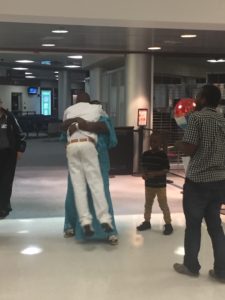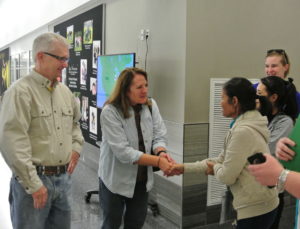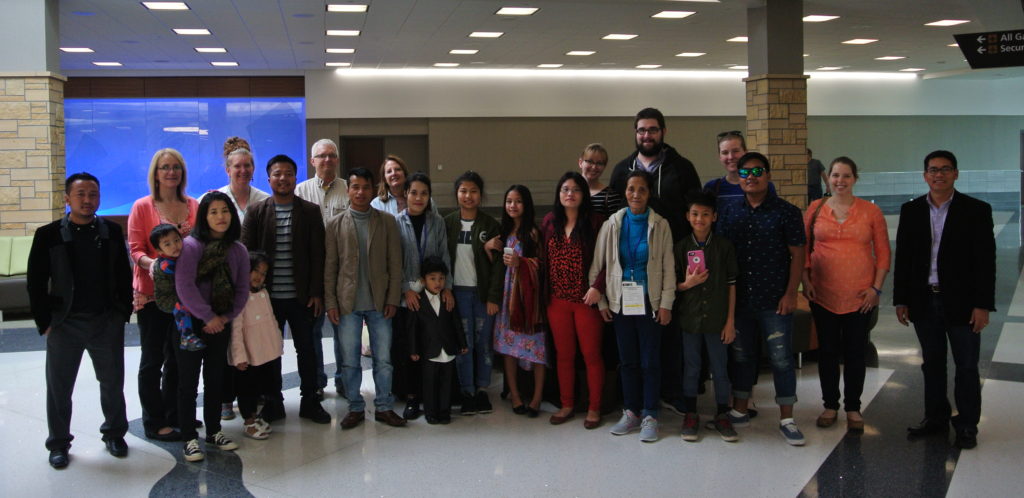
 Refugee resettlement is up and running at the Catherine McAuley Center! April brought the arrival of two siblings from Iraq and a young man from the Democratic Republic of the Congo, with a Burmese family resettled the first week of May. RefugeeRISE Americorps members, Clark Cunningham-White and Leya Neema, share an update on exciting program milestones and the program’s greatest needs moving forward below.
Refugee resettlement is up and running at the Catherine McAuley Center! April brought the arrival of two siblings from Iraq and a young man from the Democratic Republic of the Congo, with a Burmese family resettled the first week of May. RefugeeRISE Americorps members, Clark Cunningham-White and Leya Neema, share an update on exciting program milestones and the program’s greatest needs moving forward below.

We announced the resettlement program in January, but the first arrival wasn’t until April. What caused the delay and what have you and other Resettlement staff been working on in the meantime?
Clark: There was a series of executive orders that limited the ability of USCRI, our parent resettlement agency, to resettle. We weren’t sure when the first arrivals would occur.
Leya: Also we never really know exactly when a new case will arrive until the last minute. USCRI sends us assurance forms, we assure (take responsibility for) them, then when all the checkpoints are ready to go they could come at any time.
Clark: While we were waiting, we decided to plan wrap-around services for existing students and refugees in our community. We surveyed current students about what kinds of services they would be interested in that CMC doesn’t currently offer. We also looked at other organizations to see what other kinds of volunteer roles could support students.
Leya: We were also working on employment, a lot of intakes, helping students with applications, going on job shadows.
How many refugees have arrived through CMC’s Resettlement Program so far?
Clark: Six people from three families, and we just got travel notifications this morning for a family of fourteen. That’s a lot of fufu (a staple food in parts of western and central Africa)!
What has the past month looked like for these newcomers since arriving in the U.S.?

Leya: They’re doing well. We have been assisting them in applying for social security cards, medical insurance, and temporary benefits and cash assistance. We’ve taken them to their initial health screening and two of them have already been to see their new family doctor.
Clark: We’ve also assured that they have a stable household or stable apartment to make sure that where they’re living is safe and that they understand different amenities within their living space.
Leya: They’re also enrolling in schools—whether it’s an ESL program for adults or K-12 education for the one minor we’ve worked with.
How many more refugees are expected to be resettled by CMC this year?
Leya: Originally we had 29 assured before the family of 14. Out of that we’ve resettled six. The rest of those could arrive at any time.
What kinds of physical items are needed for a new refugee family, and why do we have a lot of very specific items on our wishlist? What impact do those donations have?
 Clark: USCRI provides us a list of required goods we have to make sure that the family receives. Everything from food and cleaning supplies to furniture is needed.
Clark: USCRI provides us a list of required goods we have to make sure that the family receives. Everything from food and cleaning supplies to furniture is needed.
Leya: Some of these are items seem oddly specific to us, but if we’re giving a family canned goods, they’re certainly going to need a can opener, too. They’re things the family won’t really be used to or know to ask for.
Clark: It’s also really important because if we did not get these items from an in-kind donation, that cost would come from the limited funds for the refugee. You’re lessening the financial burden for the refugee as well through these donations. We’re really grateful for all the donors who have supported this program so far.
Leya: (Looking at wish list) We’re really in need of these items. The family of fourteen will be arriving on May 26th, so the bigger items like beds and dressers are needed now and faster than ever.
Clark: We’ll also need car seats for this family. We haven’t worked with children in these first few cases but a lot of baby items are actually needed now.
How can someone get involved to support this program?
Leya: Well, for example, for the family of fourteen, there will be two to three apartments that will need to be set up. So apart from donating all of these wonderful items, we’ll also need help setting up the house.
Most adults we are resettling are employable, so having someone volunteer to be a job coach is needed as well. And for anyone who has a business and is willing to hire a refugee, contact us.
Clark: Yes, we can make suggestions about going through the orientation to make it easier for the employer to have refugees as employees.
Leya: We can always work with the employer–
Clark: –to have a mutually beneficial relationship.

A Note from Kristin, Volunteer Coordinator:
 There are many ways to support the resettlement program. As Leya said, there is a need to help get refugees moved into their new homes. We are looking for volunteers to help with everything from heavy lifting of furniture to unpacking boxes! We also have identified the need for a few new and exciting volunteer opportunities which are listed below.
There are many ways to support the resettlement program. As Leya said, there is a need to help get refugees moved into their new homes. We are looking for volunteers to help with everything from heavy lifting of furniture to unpacking boxes! We also have identified the need for a few new and exciting volunteer opportunities which are listed below.
- Friendship Exchange: Be a friend to a refugee or immigrant family by sharing meals, celebrating holidays together, or helping with answers to questions as they navigate a new culture.
- Job Coach: Help create resumes, access employment services, and complete online applications.
- Interpreter: Offer interpretation services to refugee families who are struggling to connect to resources due to a language barrier.
- Transportation volunteer: Provide a ride to important appointments and meetings for immigrant and refugee families who don’t have transportation.
Each of these new roles will require attending a two hour orientation and completing a volunteer interview. Our next orientation will be Thursday, May 18th, at 6pm at the main center located at 866 4th Ave SE. Interested volunteers can register for this orientation by emailing me at [email protected].

